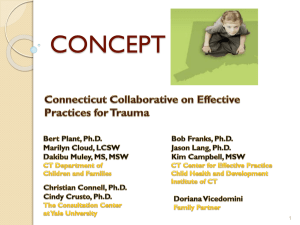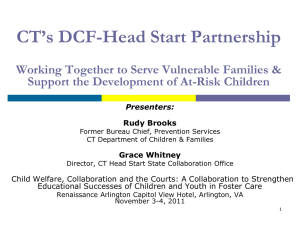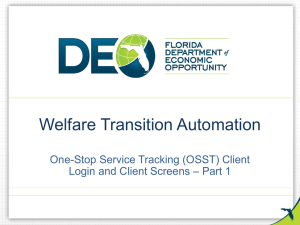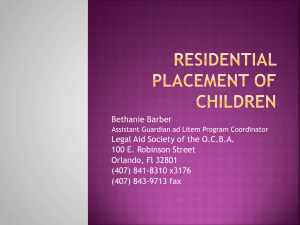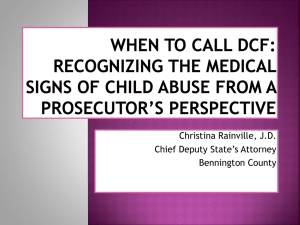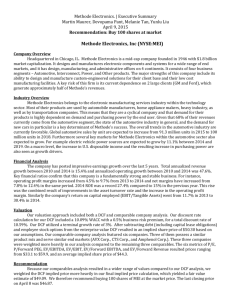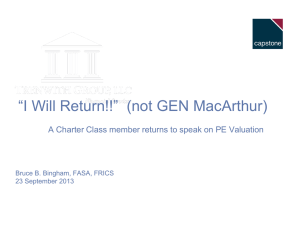Partnerships with DCF
advertisement
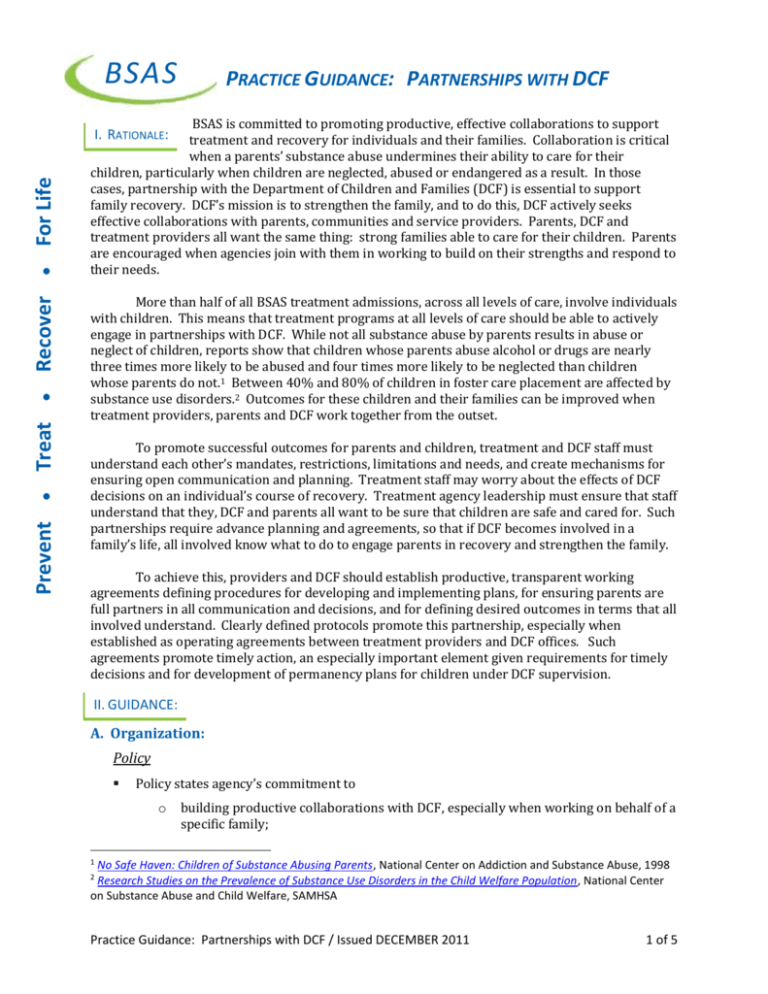
BSAS PRACTICE GUIDANCE: PARTNERSHIPS WITH DCF BSAS is committed to promoting productive, effective collaborations to support treatment and recovery for individuals and their families. Collaboration is critical when a parents’ substance abuse undermines their ability to care for their children, particularly when children are neglected, abused or endangered as a result. In those cases, partnership with the Department of Children and Families (DCF) is essential to support family recovery. DCF’s mission is to strengthen the family, and to do this, DCF actively seeks effective collaborations with parents, communities and service providers. Parents, DCF and treatment providers all want the same thing: strong families able to care for their children. Parents are encouraged when agencies join with them in working to build on their strengths and respond to their needs. Prevent ● Treat ● Recover ● For Life I. RATIONALE: More than half of all BSAS treatment admissions, across all levels of care, involve individuals with children. This means that treatment programs at all levels of care should be able to actively engage in partnerships with DCF. While not all substance abuse by parents results in abuse or neglect of children, reports show that children whose parents abuse alcohol or drugs are nearly three times more likely to be abused and four times more likely to be neglected than children whose parents do not.1 Between 40% and 80% of children in foster care placement are affected by substance use disorders.2 Outcomes for these children and their families can be improved when treatment providers, parents and DCF work together from the outset. To promote successful outcomes for parents and children, treatment and DCF staff must understand each other’s mandates, restrictions, limitations and needs, and create mechanisms for ensuring open communication and planning. Treatment staff may worry about the effects of DCF decisions on an individual’s course of recovery. Treatment agency leadership must ensure that staff understand that they, DCF and parents all want to be sure that children are safe and cared for. Such partnerships require advance planning and agreements, so that if DCF becomes involved in a family’s life, all involved know what to do to engage parents in recovery and strengthen the family. To achieve this, providers and DCF should establish productive, transparent working agreements defining procedures for developing and implementing plans, for ensuring parents are full partners in all communication and decisions, and for defining desired outcomes in terms that all involved understand. Clearly defined protocols promote this partnership, especially when established as operating agreements between treatment providers and DCF offices. Such agreements promote timely action, an especially important element given requirements for timely decisions and for development of permanency plans for children under DCF supervision. II. GUIDANCE: A. Organization: Policy Policy states agency’s commitment to o building productive collaborations with DCF, especially when working on behalf of a specific family; 1 No Safe Haven: Children of Substance Abusing Parents, National Center on Addiction and Substance Abuse, 1998 Research Studies on the Prevalence of Substance Use Disorders in the Child Welfare Population, National Center on Substance Abuse and Child Welfare, SAMHSA 2 Practice Guidance: Partnerships with DCF / Issued DECEMBER 2011 1 of 5 o ensuring parents are full partners when information about parents and their children is exchanged with DCF. o supporting parents in preventing abuse or neglect of children, particularly when resulting from parents’ substance use. Agency leadership joins with local DCF office leadership to establish protocols for information exchange, joint planning, and shared goals. Operations: Agency establishes procedures for carrying out their responsibilities as mandated reporters of child abuse and/or neglect. Agency establishes procedures for facilitating execution of consents by parents in treatment when parents are involved with DCF; Agency establishes procedures for exchanges of information with DCF when DCF becomes involved with a family, including: o o o o o Engaging parents and DCF in defining information to be shared (e.g. drug screens, assessments, participation, treatment and relapse prevention plans); Frequency and mode of information exchanges Provision for ensuring parents are informed of all communications Provision for obtaining information from DCF describing impact of substance abuse on parent’s ability to care for child and behavioral changes DCF identifies as indicating improvement in parent’s ability to care for child. Critical events such as visits, court appearances, and permanency plans. Agency and DCF establish procedures to coordinate substance abuse treatment planning and DCF service planning, and for resolving misunderstandings and conflicts. Agency identifies an agency staff person as liaison to work with DCF to carry out agreements, and ensures this person is skilled in explaining 42 CFR Part 2 (and the HIPAA Privacy Rule, when that applies), and who understands DCF mandates. Agency staff, including reception staff, know who the agency’s liaison with DCF contact is, and direct DCF calls to that person. Supervision, Training & Staff Development Staff have accurate information and understanding of 42 CFR Part 2, and can convey this understanding to individuals and to DCF. Staff is skilled in facilitating communication with parents and DCF, and in ensuring shared understanding of information provided. Staff is trained in the effects of substance abuse and substance use disorders on family relationships, parenting, and child safety, development and well-being. Staff is knowledgeable about their obligations to report suspected child abuse and neglect, and are skilled in discussing this obligation with parents. Supervision includes reflection on staff values, attitudes and beliefs about child maltreatment and about DCF. Practice Guidance: Partnerships with DCF / Issued DECEMBER 2011 2 of 5 Agency works with DCF to sponsor cross training and information sharing opportunities, with particular attention to: Understanding permanency guidelines established by the Adoption and Safe Families Act; o Understanding DCF practice model and safety mapping processes; o Promoting understanding of substance use disorders; o Incorporating child safety planning into treatment plans. o How DCF offices are organized and who treatment agency staff should call if there are questions. o B. Service Delivery and Treatment: Assessment Staff routinely follow up on questions such as ‘do you have children’ when there is a yes response, by asking about, and recording: o o o o Names and ages of children; Who children are living with and who has custody; Parent’s current contact with children, including current visitation plan, if any; and Parent’s desired contact with children if contact is limited. If parent is involved with DCF, staff obtain name and phone number of DCF social worker and supervisor, and explain the importance of establishing productive, ongoing partnerships with DCF, including sharing information about parent’s treatment, and developing shared treatment and service plans. Staff explain 42 CFR limitations and requirements and staff’s obligations under ‘51A’ mandated reporting law. Planning Treatment plans for parents involved with DCF: o Identify individual’s needs for services related to recovery for all family members (i.e. family recovery), such as parenting, child care, early intervention; o Detail plan for coordination and collaboration with DCF including responsibilities for specific services, referrals or actions, and plan for team meetings; o Define links between recovery and parent ability to care for child; o Include referrals for family therapy, as necessary, if the agency does not provide this service; o Specify important events related to DCF case, such as visits and court appearances, and meetings related to DCF service planning; o When DCF has developed a Safety Plan specific to parents’ substance use relapse prevention plan is linked to child safety and DCF Safety Plan. Service Provision Staff is able to address individuals’ ability to work productively with DCF, and to link that work to successful recovery. Treatment plan review includes discussion of family recovery. Practice Guidance: Partnerships with DCF / Issued DECEMBER 2011 3 of 5 Parents are present at review or consultation meetings between treatment provider and DCF. Education of Parents Parents are informed about o the effects of substance use disorders on families and children; o the limitations and requirements of 42 CFR Part 2, and how these might be addressed in working with DCF; o how recovery and improved family relationships benefit each other; o The importance of parents, treatment provider and DCF working together to support family recovery and child safety. III. MEASURES: Referrals for family services, such as EI, parenting, therapy Client surveys and feedback, focused on parent satisfaction with coordination with DCF Review with DCF, including data comparing repeat reports received on families alleging abuse or neglect as a result of substance abuse Survey of treatment agency staff regarding satisfaction with coordination with DCF IV. RESOURCES: Models for information sharing protocols: National Center on Substance Abuse and Children Welfare provides an array of background information and resources, including: Screening and Assessment for Family Engagement, Retention and Recovery: Provides detailed information on establishing interagency teams, protocols and best practices in communication. Pathways to Collaboration: Factors that help or hinder collaboration between substance abuse and child welfare fields. Drabble, L., Osterling, K. L., Tweed, M., & Pearce, C. A. (2008). Berkeley: University of California at Berkeley, California Social Work Education Center. New York City Partnership for Families: describes important elements and methods of information sharing. About DCF: Go to: www.mass.gov/dcf and click on links on the left about Child Abuse and Neglect Reports, DCF field structure and the Integrated Case Practice Model. Child abuse and neglect guides are available in English, Spanish, Haitian Creole, Portuguese, Khmer and Russian. Parents who would like to talk to other parents who have been involved with DCF can contact Parents Helping Parents at 800-632-8188, http://www.parentshelpingparents.org/. Massachusetts Family Recovery Collaborative Statement of Shared Values and Principles: describes shared purposes of Massachusetts substance abuse and child welfare systems. Practice Guidance: Partnerships with DCF / Issued DECEMBER 2011 4 of 5 Drug Testing in Child Welfare: Policy and Practice Considerations: A 2010 SAMHSA publication describing applications and limitations of drug testing from both child welfare and treatment perspectives. BSAS welcomes comments and suggestions. Contact: BSAS.Feedback@state.ma.us. Practice Guidance: Partnerships with DCF / Issued DECEMBER 2011 5 of 5

